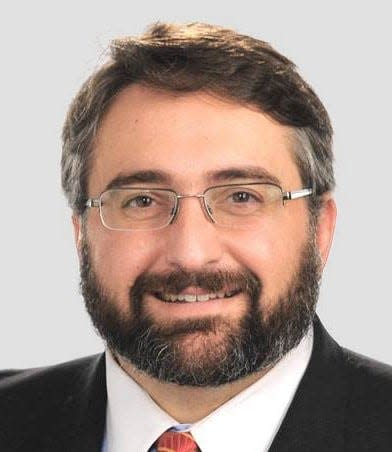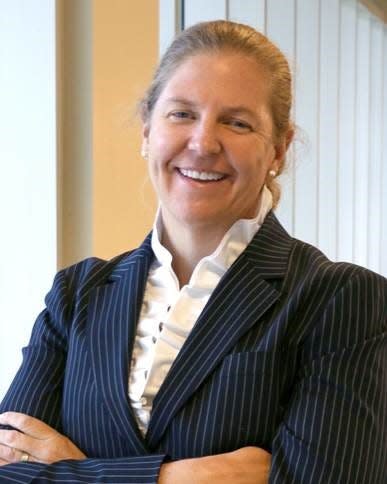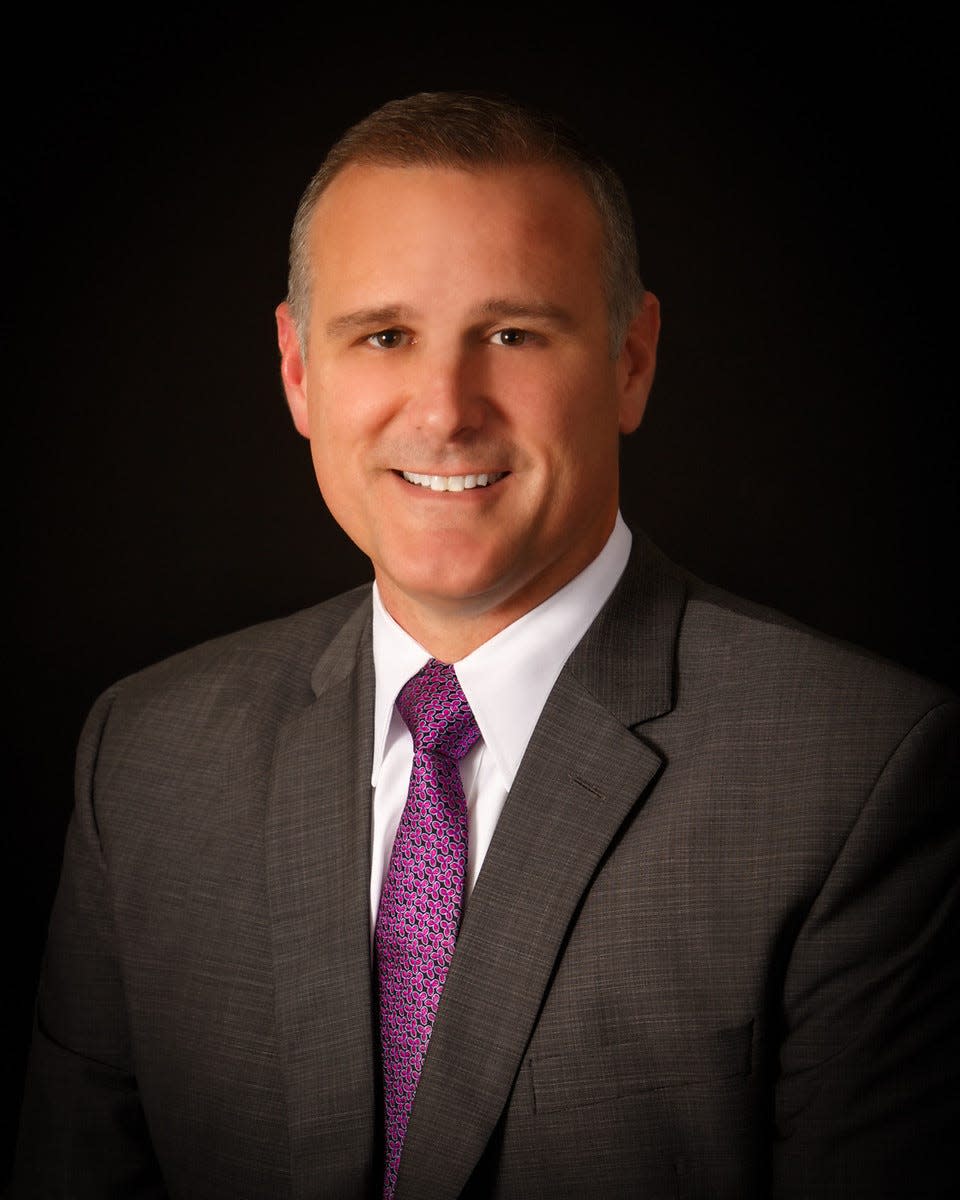Pending Mission Hospital bylaws, policies threaten to punish doctors who speak out
- Oops!Something went wrong.Please try again later.
ASHEVILLE – Since HCA Healthcare bought the Mission Health system in 2019, many patients, hospital staff, regulators and physicians have publicly and privately decried deteriorating care within the system, at the hands of its new owners.
Now some physicians who practice at the hospital believe governing documents currently under review will discourage them from speaking out against Mission.
A pending set of bylaws and policies that govern physicians who use Mission Hospital facilities, known as medical staff, has multiple provisions that physicians are concerned would concentrate power among the hospital executives and prevent doctors from criticizing the hospital publicly. Some physicians have fought to convince their colleagues to vote against the documents. Voting closes at 5 p.m. Nov. 15.
The Citizen Times obtained copies of the documents, totaling 283 pages.

Current and former Mission medical staff doctors say that Martin Palmeri, who leads Messino Cancer Center’s treatment at Mission entities, has led a campaign against the governing documents. Palmeri sent emails to medical staff doctors, outlining his concerns about the documents and advocating that colleagues vote against them. The Citizen Times obtained these emails. Palmeri declined to comment.
“I am concerned that some of the new proposals serve to empower the hospital to exert more governance over the doctors,” Palmeri wrote. He sent two emails to doctors — the latter on Nov. 11.
Opponents of the new policies are concerned with definitions of “inappropriate conduct,” more than halfway through the 231-page policy document. Physicians who commit these actions could land in a multi-stage professional review process that could ultimately lead to losing privileges to use Mission facilities.
Even though physicians have significant complaints about the way HCA runs the hospital, they have few other options to perform complicated procedures in the area. As Western North Carolina’s tertiary care center, Mission has capabilities that other hospitals in the area do not, such as a trauma team and neurosurgery. Losing medical staff privileges at Mission would damage physicians’ ability to practice in the region and their careers overall.
More: County to Mission: 'ER situation unsafe, unsustainable;' new ambulance wait time policy
Muzzling doctors, limiting criticism
Physicians who criticize the hospital in comments or in medical records could qualify as acting inappropriately, according to the pending documents.
“I feel strongly that if there are issues that could affect the care and well-being of the community, doctors have a moral obligation to address these by whatever mechanism is necessary ― including public discourse,” Palmeri wrote. He added that he could not support any policies that have the potential to “muzzle doctors.”

Making “degrading, demeaning or condescending comments” about several individuals and entities, including Mission Hospital, would qualify as a violation. Doctors would be forbidden from making “derogatory comments about the quality of care being provided at the Hospital.”
“Inappropriate medical record entries impugning the quality of care being provided by the Hospital, Practitioners, or any other individual, or criticizing the Hospital or the Hospital’s policies or processes, or accreditation and regulatory requirements,” would also qualify as a violation.
Physicians who violate these clauses could face a multi-stage professional review process.
An inappropriate conduct violation would initiate a progressive review process that begins with a “collegial meeting.” Physicians cannot bring legal counsel to these meetings or even take an audio or video recording of the meeting, according to the pending policies. Any step of this review process can be eliminated, however.
If a physician is reported for violating the inappropriate conduct statute, a combination of members of a professional evaluation committee, the chief medical officer and chief of staff would fact-find about the alleged incident. The practitioner would appear in front of a “Leadership Council” comprising mostly of Mission Hospital leadership, or individuals appointed by Mission Hospital executives. That council could place physicians on a performance improvement plan that gives the council the discretion to develop a “personal” code of conduct for the doctor.
More: AdventHealth appeals HCA's application for West Asheville freestanding emergency room
James A. Wilson, a Raleigh-based attorney who frequently represents health care professionals in hospital disputes, reviewed the section of the policy concerning dealing with inappropriate conduct. He wrote that the section he reviewed is more comprehensive than what he typically sees and keeps with the trend toward requiring physicians to exhibit a similar level of workplace conduct to hospital employees.
“Many hospitals are attempting to impose similar standards of conduct on physicians without a written policy explicitly authorizing them to do so or setting forth the standards by which the conduct will be judged or the procedures that the hospital must follow to enforce the requirements,” Wilson wrote. “I have seen only a few hospitals include the level of detail in this policy.”
Palmeri wrote that the governing documents need to have more specific language to protect physicians.
“I believe these bylaws are likely suitable if reasonable people are making patient-centered decisions, but I believe strongly that the bylaws need to be more clearly worded to ensure that physicians and patients are protected,” he wrote.
Not all the policies are new, but some physicians have expressed concern about some of the older policies, due to eroding trust with HCA leadership, sources in the meetings say.
Ansley Miller, who was recently promoted to chief medical officer for HCA physician services in North Carolina, told doctors during a recent town hall meeting to discuss the bylaws that they should funnel their complaints through official channels within the hospital rather than bringing them public, according to multiple sources who attended the meeting and contemporaneous documentation. Miller was not made available to the Citizen Times for comment.

The policies and bylaws went to a medical staff vote after they were reviewed by the Medical Executive Committee, formed mostly of doctors who recently signed a letter touting the care HCA provides, according to doctors in the town hall meetings. HCA consults Horty Springer, a Pittsburgh-based law firm, for guidance in preparing its governing documents, sources from the meeting said. The Citizen Times reached out to Horty Springer for comment.
Palmeri noted in his email that many of the physicians who spoke publicly initially tried to discuss the issues with their practice area leaders and administration.
“Only after these pathways failed have they turned to their communities,” he wrote.
Phillip Jackson, an Asheville-based attorney who represents HCA in many of its local litigation matters, also attended the meeting. He helped interpret the governing documents and advise physicians on how they would comply with the pending policies. Jackson declined to comment.
Mission Hospital spokesperson Nancy Lindell would not answer Citizen Times’ questions about the bylaws.
“The medical staff bylaws are a set of governing documents that are mutually agreed upon by hospitals and medical staffs across the country and that are intended to set transparent, mutual expectations,” she said in a Nov. 14 statement. “The hospital views the collaborative review and approval of bylaws as a confidential process and out of respect for the medical staff, will not comment further.”
A spokesperson for UNC Pardee did not respond to Citizen Times questions by press time about whether their medical staff governing documents have similar language to what physicians are considering at Mission. AdventHealth spokesperson Victoria Dunkle declined to comment.
More: McDowell EMS Director: Mission CEO Patrick 'disconnected' from emergency department issues
More: NC Attorney General: HCA Healthcare failed to comply with Mission purchase contract
Empowering executives
The bylaws give the Board of Trustees of the hospital discretion to terminate medical staff privileges. That board currently includes the President of HCA’s North Carolina Division Greg Lowe, Chief Executive Officer Chad Patrick, other Mission Hospital executives and community members.

“All Practitioners are subject to termination or modification of their Medical Staff Membership and/or Clinical Privileges by the Board of Trustees, based on factors deemed relevant by the Board of Trustees,” the bylaws read. “Actions taken by the Board of Trustees are expected to substantially comply with the Medical Staff Governance Documents, subject to the Board of Trustee’s retained right to rescind any delegation of authority and with the understanding that strict compliance is not required.”
The North Carolina Medical Society, which represents physicians and medical professionals in the state, is reviewing the governing documents, according to spokesperson Randy Aldridge.
“The NCMS advocates for the autonomy of medical staff to work with hospital partners to craft necessary bylaws and governing policies that enhance quality care, ensure patient safety, and foster transparency,” Aldridge wrote.
Palmeri also took issue with a provision of the policies that would require physicians to pay for HCA’s legal fees if they challenge the hospital in legal action regarding professional review and lose. He wrote that HCA’s deep pockets would dissuade doctors from defending themselves in litigation.
Using speech and the law to fight back
Physicians frustrated with the care and conditions at Mission Hospital after the HCA acquisition have resorted to the public sphere and the court to voice and address their concerns.
Allen Lalor, a former emergency room doctor at the hospital, authored a whistleblower lawsuit with Scott Ramming, who still works in the hospital system, alleging that the hospital system systematically ordered superfluous tests to drive up Medicare and Medicaid reimbursements.
More: 'Blackballed' doctor's lawyer says HCA's legal response topples like a 'house of cards'
Lalor said physicians need to prioritize patient safety rather than protecting the hospital, even if that means speaking out.
“We take a Hippocratic oath to protect the patient,” he said. “We do not take a Hippocratic oath to protect HCA.”
Lalor recently helped organize a letter addressed to the firm responsible for reviewing whether HCA violated the commitments it made as part of the 2019 purchase of the hospital. Around 130 physicians have signed the letter now, he said. Miller helped coordinate a response.
“My goal moving forward is to empower doctors to do what we do best … care for patients,” Palmeri wrote.
Mitchell Black covers Buncombe County and health care for the Citizen Times. Email him at mblack@citizentimes.com or follow him on Twitter @MitchABlack. Please help support local journalism with a subscription to the Citizen Times.
Proposed Bylaws by Mitchell Black on Scribd
Policy1 by Mitchell Black on Scribd
Policy2 by Mitchell Black on Scribd
Policy3 by Mitchell Black on Scribd
Policy4 by Mitchell Black on Scribd
Policy5 by Mitchell Black on Scribd
Policy6 by Mitchell Black on Scribd
This article originally appeared on Asheville Citizen Times: Mission Hospital pending governing documents may silence doctors

